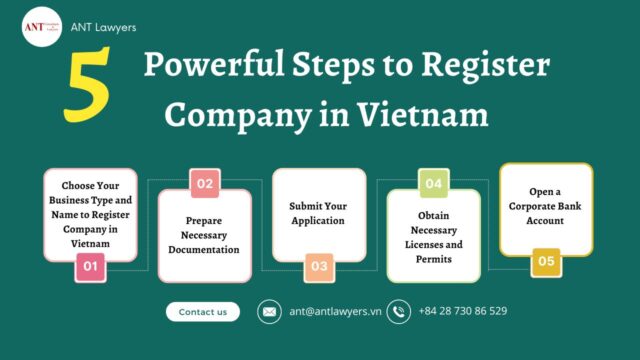Vietnam is rapidly becoming a premier destination business, thanks to its robust post-COVID economic recovery, vibrant tech sector, and attractive living conditions. For entrepreneurs and businesses looking to tap into this dynamic environment, understanding how to register company in Vietnam is crucial. This comprehensive guide will walk you through the necessary steps to register company in Vietnam and highlight why this vibrant country is a hotbed for global business opportunities.
Understanding the Business Climate in Vietnam
Before you begin the process to register company in Vietnam, it’s important to appreciate the local business landscape. Vietnam’s economy has shown remarkable resilience and growth following the global pandemic, driven by strong governmental reforms, a growing middle class, and increased digital adoption. The country offers a strategic location in Southeast Asia, making it an ideal hub for trade and a gateway to other ASEAN markets.

5 Steps to Register Company in Vietnam
Step 1: Choose Your Business Type and Name to Register Company in Vietnam
Step 2: Prepare Necessary Documentation
Step 3: Submit Your Application
Step 4: Obtain Necessary Licenses and Permits
Step 5: Open a Corporate Bank Account
Step 1: Choose Your Business Type and Name to Register Company in Vietnam
The first step to register company in Vietnam involves deciding on the type of business entity you want to establish. Common forms include a limited liability company (LLC), joint-stock company (JSC), each catering to different business needs and scales. Following this, selecting a unique company name is essential, as it must be checked in advance.
Step 2: Prepare Necessary Documentation
For foreign investors looking to register a company in Vietnam, the process involves two main steps:
Investment Registration Certificate (IRC): Investors must first apply for the IRC, which requires submitting a detailed proposal including the investment project’s objectives, scale, location, capital and capital mobilization plan, duration, and schedule.
Business Registration Certificate (ERC): Once the IRC is approved, the investor can apply for the ERC. This step involves submitting the company’s charter, list of shareholders, and legal documents of the appointed representatives.
These steps ensure compliance with Vietnamese laws and set the foundation for legal business operations in the country.
Step 3: Submit Your Application
To apply for the Investment Registration Certificate (IRC) and the Business Registration Certificate (ERC) in Vietnam, foreign investors typically need to submit their applications to the Provincial Department of Planning and Investment (DPI) of the location where the investment is planned. This department is responsible for reviewing and approving both IRC and ERC applications, ensuring that foreign investments comply with local regulations and policies.
Step 4: Obtain Necessary Licenses and Permits
Depending on the nature of your business, specific licenses and permits may be required to legally operate after you register company in Vietnam. The time and effort to obtain these can vary significantly, so it’s advisable to start this process early to avoid delays.
Step 5: Open a Corporate Bank Account
Once your company is registered, opening a corporate bank account is one of the final steps. This is essential for any financial transactions, receiving capital, and handling employee salaries. Vietnam’s banking sector is robust, with a mix of local and international banks offering various services tailored to business needs.
Why Vietnam is Attractive for Business and Expatriates
After successfully completing the process to register company in Vietnam, entrepreneurs can leverage a number of strategic advantages. The country not only offers a thriving economic climate but also provides a quality of life that is highly appealing to expatriates. Its cultural richness, scenic landscapes, and affordable living costs make it an excellent place for foreigners to settle and integrate into the local community while managing a business.
Vietnam’s technology sector, in particular, is a significant draw. The country is home to a growing pool of tech talent with capabilities in software development, AI, and digital marketing, available at competitive salaries compared to Western standards. This makes Vietnam an ideal location for tech startups and IT companies looking to register company in Vietnam and outsource their operations.
In conclusion, to register company in Vietnam is to open the door to a myriad of business opportunities in one of Southeast Asia’s most dynamic economies. The process, which can take from two months depending on the business specifics, is a worthy investment of time and resources. By aligning with local regulations and cultural norms, businesses can thrive in a market characterized by rapid growth and a strategic gateway to both Asian and global markets.
About ANT Lawyers, Law Firm in Vietnam
We help clients overcome cultural barriers and achieve their strategic and financial outcomes, while ensuring the best interest rate protection, risk mitigation and regulatory compliance. ANT lawyers has lawyers in Ho Chi Minh city, Hanoi, and Danang, and will help customers in doing business in Vietnam.
Source: https://antlawyers.vn/update/5-steps-register-company-in-vietnam.html
0 nhận xét trong bài "5 Powerful Steps to Register Company in Vietnam: Seizing Opportunities in a Growing Market"
Đăng nhận xét
- Vui lòng gõ có dấu khi sử dụng tiếng việt.
- Nghiêm cấm spam link khác.
- Sử dụng ngôn ngữ có văn hóa khi comment.